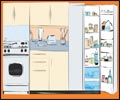
Reduce energy consumption in your new home
By on Apr 03, 2008

Reducing Energy Consumption
By Glenn Dunphy
Years ago when I dreamt of being a pilot, I went foran introductory flying lesson. Before we didanything the pilot walked me around the small two-seater we were going to fly. She seemed to look at every rivet and explained her observations as she went. When we finally sat in the plane she did the same with each dial and control. If you own a home or condo your "pre-flight" check should be done at least twice a year. Before winter and before summer, when you are preparing to heat or cool your home.
There is a smorgasbord of "little" things to do that will reduce your energy consumption, make your home more comfortable, and save you money. This list is far from exhaustive so make sure you do some research to see what else you can do.
In the basement, you can take a look at your water heater - this is one of those situations where you really should read the manual to check the temperature setting. If you consistently turn your cold water up as much as your hot water to make your shower just right, your hot water heater is set too high. Set it to lowest setting and test it out, you might find it hot enough for your showers or for doing dishes. While in the basement, check your ducts for air leaks. Though the heat lost through leaky ducts generally stays in the house, leaks will reduce the overall efficiency of your furnace. Even in new homes this is a common problem. Look for sections that have come slightly apart during construction. You can use self-tapping metal screws to bring them together or good old fashioned duct tape. If you use duct tape to repair and seal your ducts, look for tape with the Underwriters Laboratories logo as anything else will eventually dry out and peel off. Be sure the spot you are repairing is free of dust and dirt before application.
In the kitchen, you should check to see if your fridge and dishwasher have energy savings settings and learn how to use them. Always tightly cover the leftover food or liquids because uncovered they will release moisture and that added moisture forces your compressor to work harder. If your fridge has condenser coils on the back, clean them once or twice a year. And despite what your mother says, scraping plates and bowls is enough - you don't need to soak or prewash before loading the dishwasher. Only do this if food is burned on. Don't turn your dishwasher on everyday after dinner, only run it when it is full and since many new models have internal water heating elements, check your manual to see if you can set yours to a lower setting. Also look into getting a faucet aerator for the kitchen tap.
When doing your laundry, try to wash and dry loads that are full. With small loads be sure to use the appropriate water settings. Hang dry small loads on a collapsible clothes hanger rather than using the dryer. Don't overdry your clothes - pay attention to how long it takes to dry your clothes and set the timer appropriately. Your clothes should not come out of the dryer burning hot. Clean the dryer's lint collector after each load and periodically check the vent exhaust on the outside of the house. If it gets blocked with lint, your dryer will have to work much longer to remove the moisture from your clothes, and it can be a fire hazard.
In the bathroom, install a low-flow showerhead. Make sure the toilet doesn't run after you flush and the number one bathroom waster: leaving the water running while brushing your teeth. Turn it off and use a cup.
We don't need to do a major check of our home every time we go in or out, but if we're conscious of these small seasonal fixes it will pay off in the end.


